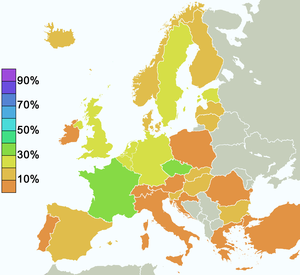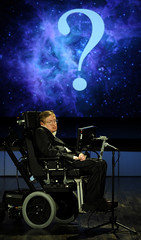I discussed Massimo Pigliucci's attack on Jerry Coyne in
my last blog, and coincidentally listened to
Pigliucci's talk from last month on
Conversations from the Pale Blue Dot, discussing his new book
Nonsense on Stilts. It includes a lot of interesting stuff on his speciality, the Philosophy of Science, and most of it seems eminently sensible.
He and the interviewer unfortunately go off the rails at the end when talking about the new atheists; a problem too many people have, it seems! Here's what is said, starting at 47:20:
...I find myself, on the one hand, being put into the so-called accommodationist camp - those are people who actually think that science and religion are compatible, and I don't. I absolutely do not think that they're compatible (....)
...I don't think they're compatible as a matter of approach, as an intellectual approach.
This surprised me a *little* since Pigliucci had said that Coyne was wrong to call theist scientists 'philsosophically inconsistent'. I guess if he had called them 'intellectually inconsistent', that would have been fine, since that is clearly what Pigliucci is calling them here. And he reinforces this by explaining that scientists should change their mind as the evidence comes in, whereas religion is about faith; in his book, believing things regardless of the evidence.
[Incidentally, accommodationism has come to have two meanings:
1) That science and religion are compatible worldviews.
2) The tactical view that religious believers being treated with civility at all times will achieve a better result in the public sphere for science and reason.
Pigliucci has denied he's one of the first, but I think agrees with the second stance.]
He points out that there is nothing new about the new atheism,
which I certainly agree with. Their arguments are often centuries old. What makes it new is the social impact, which, he says, may be a fluke. This seems to me to be quite possible - such social movements are emergent phenomena. Pigliucci continues:
The thing that I really don't particularly care for is the strident tone (...) you can be firm about your criticism of somebody else without necessarily calling them a bunch of idiots. I think that once you start calling people names, you lost the high ground, the high moral ground. And so when Dawkins goes around saying that every religious person is stupid, er, that doesn't help.
Well I'm *pretty* sure Dawkins has never said that every religious person is stupid. He's friends with religious people who are demonstrably clever, for goodness sake. On the whole he thinks they are mistaken, although inevitably many of them are also stupid. Inevitably lots of atheists are stupid too. So Pigliucci identifies name-calling as losing the moral high ground, but is happy to misrepresent Dawkins' view of religious people. An insight into
his moral standards, I suppose. It's not clear also what he means by 'the strident tone', other than name-calling - so perhaps that is all he means. But that isn't *tone*, but *abuse*. Curious. And, as I've pointed out before,
Pigliucci has been called out on his tone too - "Tone matters. And sarcasm is not science.". Which leaves one wondering just what it is he wants of the new atheists, and thinking that he needs to chillax a bit over insults. For all I know it's possible that a good insult could oil the wheels of discourse, and he doesn't produce any evidence to disabuse me of this. Further, I don't like his tone! But a sarcastic, sneering tone is simply not the sort of thing that puts theists off atheism, that much should be obvious. Anyway, he moves onto another concern:
...I think that Dawkins and more recently Jerry Coyne are epistemologically naive (...) they fall into something that is called 'scientism', that is the idea that science is equated with reason, that the two are one and the same thing.
This is his accusation, but it doesn't seem to stand up, to my mind. I don't interpret Dawkins' and Coyne's comments as
equating reason and science. Reason is surely part of science, and surely you can reason without doing science. But the best method of understanding the world around us is through the use of reason and evidence, which is commonly identified with the scientific outlook. If Pigliucci wants to draw an arbitrary demarcation line between philosophy and science to allow philosophers a lot more reason, and scientists a lot less, then fine; who's stopping him. But to call out Coyne and Dawkins based on his own demarcation (or, to be fair, the demarcation posited by philosophers of science) is pretty self-indulgent and, er, pointless. Well I say pointless, but it comes over as point-scoring frankly. It doesn't change the fact that the best way to discover what *is*, is through reason and evidence, and this is commonly known as the scientific outlook.
I do think that science, for very good epistemological reasons, has nothing to say about the supernatural; it can dismiss specific claims that supernaturalists make, but it cannot dismiss the God hypothesis.
This is Hume - "...it cannot dismiss the God hypothesis" is just what Dawkins has always said (including in
The God Delusion), and Coyne, as far as I know, so one wonders what his beef is with them.
... so those are my disagreements.
But the second is patently not an area of disagreement; Dawkins and Coyne would surely agree to that statement? One has to assume he concludes that because science can say nothing about the supernatural, that somehow means it's not incompatible with the supernatural.
So I think he draws the wrong conclusions from this sensible statement;
as I've said before, the reason science has nothing to say about the supernatural is because the whole notion invalidates the scientific method. Therefore, the supernatural is incompatible with science. I cannot see how it could be anything else; obviously Pigliucci doesn't think they're compatible ("I absolutely do not think that they're [science and religion] compatible"), but he also seems to be saying they're not incompatible. so he seems to be angling for some kind of agnostic compatibility status midway between compatible and incompatible; well, I have no idea what he's angling for.
The interviewer, Luke Muehlhauser, then says:
...a lot of people have said that not only could the new atheists take a different approach and not name-call everybody, but also maybe they're not really putting forward the best intellectual case for atheism or naturalism that they could, and that wouldn't be that surprising because none of them are scholars of religion or these arguments, but I wonder if you might say a few words on how you think atheists in general might make a better intellectual case for atheism or naturalism.
A high error count; First, Pigliucci has already pointed out that the new atheists are only using the old arguments, so how could they *not* be putting forward the best intellectual case? The matter's been settled for the vast majority of intelligent thinkers. Second, again, they *don't* name-call everybody. Third, they plainly *are* scholars of 'these arguments', as much as anyone, including Pigliucci, is. How much theology does one have to suffer before one is allowed to say 'enough, already'? There's no evidence for it, so any theology is *arbitrary*.
It's disappointing to see this; these assertions seem to have become an article of faith amongst accommodationists - they simply don't entertain the idea that they might be mistaken, and glibly carry on as if they're a given.
And indeed, Pigliucci does glibly carry on, overlooking the contradiction to his earlier statement.
... I don't think that religion is the root of all evil, as Dawkins famously said., that's another example of an exaggeration that doesn't help anybody...
Well,
quite the opposite, actually, so ...'that's another example of an exaggeration that doesn't help anybody':
(Dawkins - "I do not believe that religion is the root of all evil, thank you Channel 4. Religion is the root of quite a lot of evil, but that didn’t make for a catchy title.")
Pigliucci then goes on to make the bogus comparison between atheistic Stalinism and Maoism 'group-think' and religious ideologies, which makes one question how much he's really thought about this subject. He then makes vague accusations that some atheists aren't very clever or thoughtful, which seems to be stating the obvious, as well as irrelevant. Oddly, he then points out, correctly, that atheism isn't a positive thing, but an absence of belief, which renders his previous ramble about atheist group-think incoherent. And this is confirmed when he compares atheism to a-unicornism.
So he points out the positive *philosophies* that arise from the evidence based worldview, such as secular humanism and naturalism, but is keen to emphasis that they are *philosophies*, even if they are informed by science. But the whole point of them is that they are informed by science; that is their defining feature, and why they're *compatible* with science, and other philosophies aren't. And we are back wondering again, just what his beef is, and how such a scholar could make such basic errors.
 Image via Wikipedia
Image via Wikipedia


















